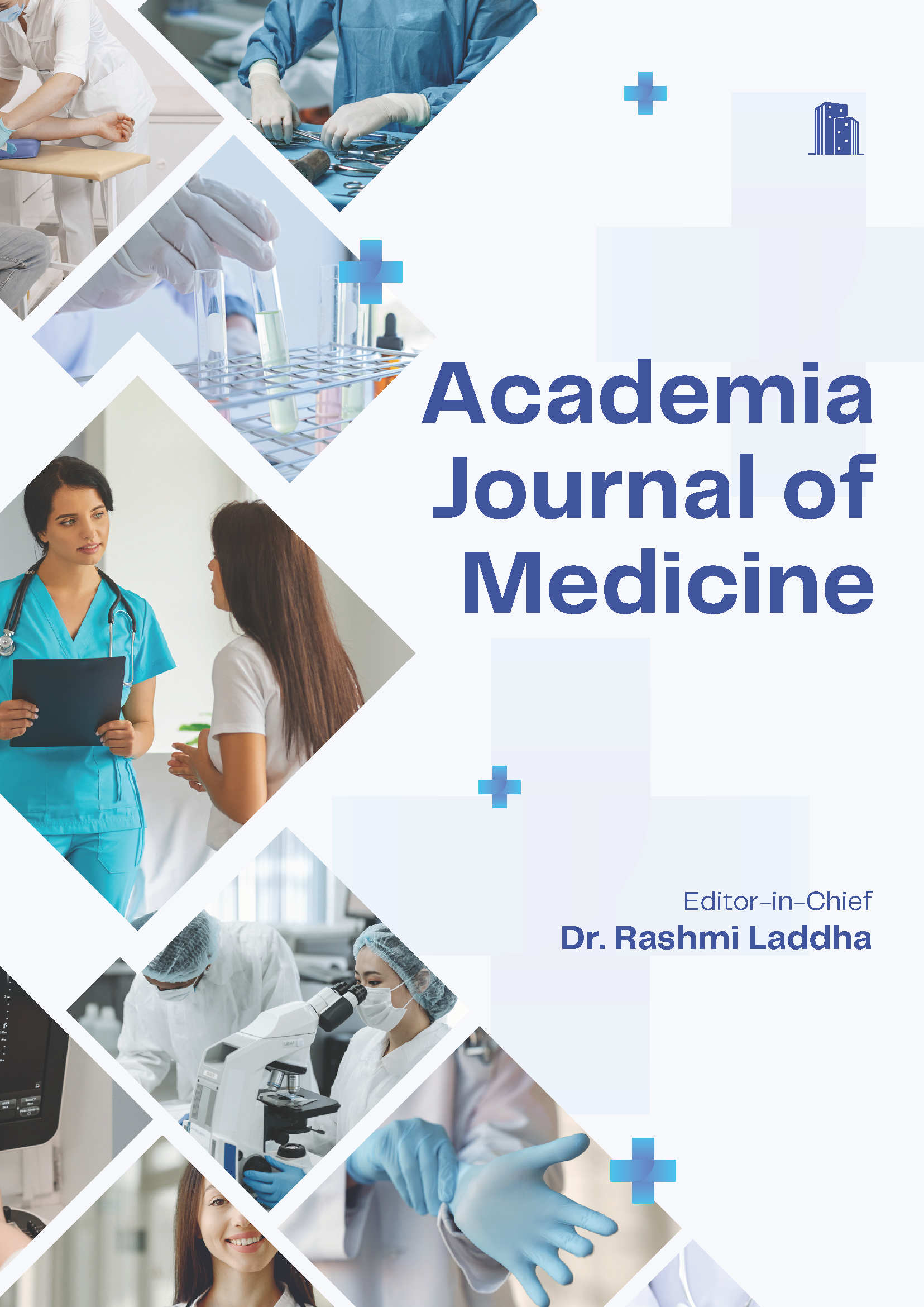Effects of Yoga on Blood Pressure and MDA in Mild Hypertensive Patients.
DOI:
https://doi.org/10.48165/348f2h34Keywords:
Yoga, hypertension, MDA, CVDAbstract
Background: Cardiovascular diseases (CVD) have emerges as the leading cause of mortality throughout the world. Essential hypertension is one of the important risk factor for CVD in modern society despite advanced and effective management. Malondialdehyde (MDA) is a well known marker of oxidative stress, which is produced by oxidation of poly unsaturated fatty acid. Nadishodhan pranayam leads to decrease stress as well as blood pressure. Subjects and Methods: It was an interventional type of study. Ninety seven mild hypertensive patients (53 males and 44 females) of group I completed the yoga program. While, fifty normotensive subjects were include as control in group II. Blood pressure and MDA was measured of every participants before and after three months of yoga program. Results: Total ninety seven mild hypertensive patients of age 33.6± 8.66 years of group I completed three months yoga program. However, fifty subjects (34.7± 7.73 years)of group II had not done any yogic exercise during three months. Results of the present study showed that there was a significant difference in SBP (p<0.001), DBP (p<0.001), HR (p<0.001), PP (p<0.001) and MAP (p<0.001) group I mild hypertensive patients after following three months yoga program. There was a significant difference between before and after yoga program MDA level of group I mild hypertensive patients. However, there was an insignificant difference between before and after three months level of MDA in group II control subjects. Conclusion: In this study, it has been observed that daily practice of yoga improves the blood pressure of mild hypertensive patients. Moreover, it substantially decreases the oxidative stress. Yoga can be an effective alternative to reduce the blood pressure in mild hypertensive patients either with medication or without medication.
References
1. Mozaffarian D, Wilson PW, Kannel WB. Beyond established and novel risk factors for cardiovascular disease. Circulation 2008;117(23):3031–38.
2. Carretero OA, Oparil S. Essential hypertension: Part I: definition and etiology. Circulation 2000;101:329–35.
3. Kuklinska AM, Mroczho B, Musical WJ, Usowicz-Szarynska M, Sawicki R, Borowska H, et al. Diagnostic biomarkers of essential arterial hypertension: the value of prostacyclin, nitric oxide, oxidized – LDL, and peroxide measurements. Int Heart J 2009;5: 341–51.
4. Intersalt Co-operative Research Group. Sodium, potassium, body mass, alcohol and blood pressure: the intersalt study. J Hypertens 1988;6(suppl.4):S584–6.
5. Sever PS, Poulter NR. A hypothesis for the pathogenesis of essential hypertension: the initiating factors. J Hypertens. 1989;7(suppl.1):S9– S12.
6. Whelton PK. Epidemiology of hypertension. Lancet 1994:344: 101–6. 7. Kunwar A, Priyadarsini KI. Free radicals, oxidative stress and importance of antioxidants in human health. J Med Allied Sci 2011;1(2):53–60.
8. Yadav RK, Ray RB, Vempati R, Bijlani RL. Effect of a comprehensive yoga-based lifestyle modification program on lipid peroxidation. Indian J PhysiolPharmacol 2005;49(3):358–62.
9. Montezano A, Touyz RM. Reactive oxygen species, vascular Noxs and hypertension: focus on translational and clinical research. Antioxident Redox Singling 2013;22.
10. Walter MF, Jacob RF, Jeffers B, Ghadanfar MM, Preston GM, Buch J, et al. Serum levels of thiobarbituric acid reactive substances predict cardiovascular events in patients with stable coronary artery disease: a longitudinal analysis of the prevent study. J Am Coll Cardiol 2004;44(10):1996–2002.
11. Okonta NR. Does yoga therapy reduce blood pressure in patients with hypertension? An integrative review. Holist Nurs Pract 2012;26(3):137–41.
12. Agte VV, Jahagirdar, Tarwadi KV. The effects of SudarshanKriya Yoga on some physiological and biochemical parameters in mild hypertensive patients. Indian J Physiol Pharmacol 2011;55(2): 183–7.
13. Mahapure HH, Shete SU, Bera TK. Effect of yogic exercise on supra oxide dismutase levels in diabitics. Int J Yoga 2008; 1(1):21–6. 14. Sinha S, Singh SN, Monga YP, Ray US. Improvement of glutathi¬one and total antioxidant status with yoga. J Altern Complement Med 2007;13(10):1085–90.
15. Bhattacharya S, Pandey US, Verma NS. Improvement in oxida¬tive status with yogic breathing in young healthy males. Indian J Physiol Pharmacol 2002;46(3):349–54.
16. Subbalakshmi NK, Saxena SK, Urmimala, D’Souza UJA. Imme¬diate effect of ‘Nadi–Shodhana Pranayama’ on some selected parameters of cardiovascular, pulmonary, and higher functions of brain. Thai J Physiol Sci 2005;18(2):10–16.
17. Sukhdev S, Vishaw G, Ved P. Effects of a 6-week nadi-shodhana pranayama training on cardio-pulmonary parameters. J Physical Educ Sports Manage 2011;2(4):44–7.
18. Frisoli1 TM, Schmieder RE, Grodzicki T, Messerli FH. Beyond salt: lifestyle modifications and blood pressure. European Heart J 2011;32:3081–7.
19. Mossa MM, Bushra MM, Salih MR, May NY. Estimation of malondialdehyde as oxidative factor & glutathione as early detectors of hypertensive pregnant women. Tikrit Med J 2009; 15(2):63–9.
20. Svetkey LP, Erlinger TP, Vollmer WM, Feldstein A, Cooper LS, Appel LJ et al. Effect of lifestyle modifications on blood pressure by race, sex, hypertension status, and age. J Human Hypertension 2005;19:21–31.
21. Jiro M, Hiroshi I, Sanae H, Kazuo T, Tsuguru H, Tetsuo N, et al. Low frequency regular exercise improves flow-mediated dila¬tation of subjects with mild hypertension. Hypertens Res 2005; 28:315––21.
22. Pal GK, Chandrasekaran A, Hariharan AP, Dutta TK, Pal P, Nanda N et al. Body mass index contribute to sympathovagal imbalance in prehypertensives. BMC Cardiovascular Disord 2012;12:54
23. Santella DF, Araujo EA, Ortega KC, Tinucci T, Mion D Jr., Negrao CE, et al. After effects of exercise and relaxation on blood pressure.

